 Our World
Our World  Our World
Our World  Crime
Crime 10 Dark Details of the “Bodies in the Barrels” Murders
 Animals
Animals The Animal Kingdom’s 10 Greatest Dance Moves
 Movies and TV
Movies and TV 10 Box Office Bombs That We Should Have Predicted in 2025
 History
History 10 Extreme Laws That Tried to Engineer Society
 History
History 10 “Modern” Problems with Surprising Historical Analogs
 Health
Health 10 Everyday Activities That Secretly Alter Consciousness
 History
History Top 10 Historical Disasters Caused by Someone Calling in Sick
 Animals
Animals 10 New Shark Secrets That Recently Dropped
 Movies and TV
Movies and TV 10 Forgotten Realities of Early Live Television Broadcasts
 Our World
Our World 10 Places with Geological Features That Shouldn’t Exist
 Crime
Crime 10 Dark Details of the “Bodies in the Barrels” Murders
 Animals
Animals The Animal Kingdom’s 10 Greatest Dance Moves
Who's Behind Listverse?

Jamie Frater
Head Editor
Jamie founded Listverse due to an insatiable desire to share fascinating, obscure, and bizarre facts. He has been a guest speaker on numerous national radio and television stations and is a five time published author.
More About Us Movies and TV
Movies and TV 10 Box Office Bombs That We Should Have Predicted in 2025
 History
History 10 Extreme Laws That Tried to Engineer Society
 History
History 10 “Modern” Problems with Surprising Historical Analogs
 Health
Health 10 Everyday Activities That Secretly Alter Consciousness
 History
History Top 10 Historical Disasters Caused by Someone Calling in Sick
 Animals
Animals 10 New Shark Secrets That Recently Dropped
 Movies and TV
Movies and TV 10 Forgotten Realities of Early Live Television Broadcasts
10 Mythological Disputes That Got Ridiculously Out Of Hand
Mythology is full of arguments. After all, conflict is the basis of a good story and these are stories that have survived for thousands of years. Sometimes it seems like the characters in these tales should calm down a bit, though. Luckily for us, they decided to go utterly crazy instead.
10 Old Man And A Rock

You may remember Old Man from the incident with his anus that we mentioned before. However, this trickster from Blackfoot Indian mythology didn’t limit himself to a single incident of off-the-wall craziness.
One day, Old Man was traveling and decided to sit down and have a rest on a rock. When he was ready to travel again, he placed his cloak on the rock and said “You can keep this for letting me rest.” It was a warm day anyway. What could possibly change?
It began to rain shortly thereafter. Old Man was traveling with Fox (or Coyote, in another version of the story) and told his companion “Go and get my robe from the rock so we can have shelter.” When Fox returned, he didn’t have the cloak, explaining that the rock insisted that the gift was irrevocable. Old Man went back himself and gave the rock a lecture before yanking his robe back.
As he left, a thunderstorm began to brew. Before long, Old Man was running as fast as he could while the rock rolled after him. Old Man ripped off all of his clothes and threw them away so he could run faster. He saw some buffalo and pleaded with them to stop the rock. They tried, but they were crushed to death. Deer, antelope, and bears met the same fate. A group of rattlesnakes held themselves together in the form of a lasso and tried to catch the rock, but they also failed.
The rock was catching up quickly, clipping Old Man’s heels, when he saw some nighthawks circling overhead. “Help me, I am almost dead!” he pleaded. The nighthawks took turns dive-bombing the rock, chipping off a small section with each hit. Eventually, one bird hit the rock right in its center and split it in two, ending Old Man’s peril.
Soon after, Old Man came across the children of the birds that had saved him, resting in their nest by the river. He shouted “Your parents spoiled my fun by splitting the rock that was chasing me!” and tore their mouths wide open. When the older birds returned and found out about it, they chased Old Man and defecated all over him.
9 Parikshit And All The World’s Snakes
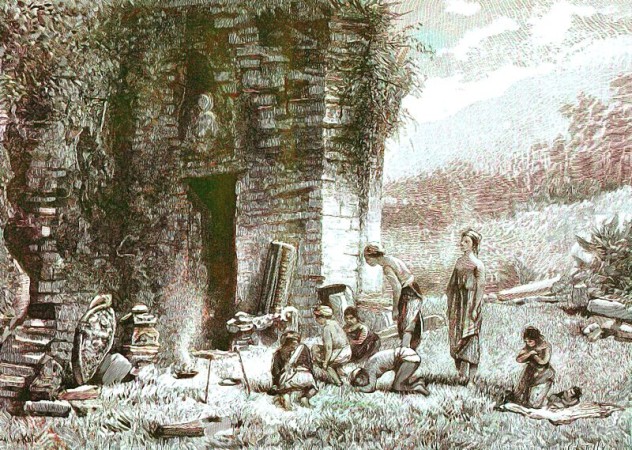
One day, mythological Hindu king Parikshit was out hunting when he got thirsty. He came upon the hut of an old man and asked for a drink. The man was a sage, however, and he was in a meditative trance. Not realizing this and affronted by the snub, Parikshit threw a dead cobra at the sage in frustration, then went back to his palace.
The sage’s son, Gavijata, was teased by his friends about this turn of events, as it was an insult to his father. In anger, Gavijata cursed Parikshit to be bitten and killed by the king of the snakes, Takshaka, within seven days. When Gavijata later learned that the whole thing had been a misunderstanding, he decided he had overreacted and warned the king.
To protect himself, Parikshit quickly built a palace on a pillar in the middle of the ocean and surrounded it with psychic guards, but Takshaka managed to get in anyway by hiding inside an apple intended for Parikshit’s lunch. When the king picked up the fruit, the snake god transformed back to his full size and killed Parikshit instantly.
When Parikshit’s son, Janamejaya, ascended the throne, he was determined to avenge his father’s death. He decided to kill every snake in the universe, including Takshaka. The king of the snakes sought refuge with Indra, the lord of Heaven, but Janamejaya wasn’t put off—he was willing to kill Indra as well, if necessary.
The new king had his priests build a great fire and recite powerful chants that drew in snakes from all over the world. Takshaka was pulled toward it and Indra decided to let him go rather than be pulled in as well. Thousands of snakes were burned, but Janamejaya had inconveniently forgotten a promise he had made to a boy named Aasteek. Having been impressed by his sweet voice, the king had granted him one wish, which Aasteek now decided to use to free the snakes. Janamejaya reluctantly honored the agreement and the snakes of the world were saved.
8 Hercules Opens A Bottle Of Wine
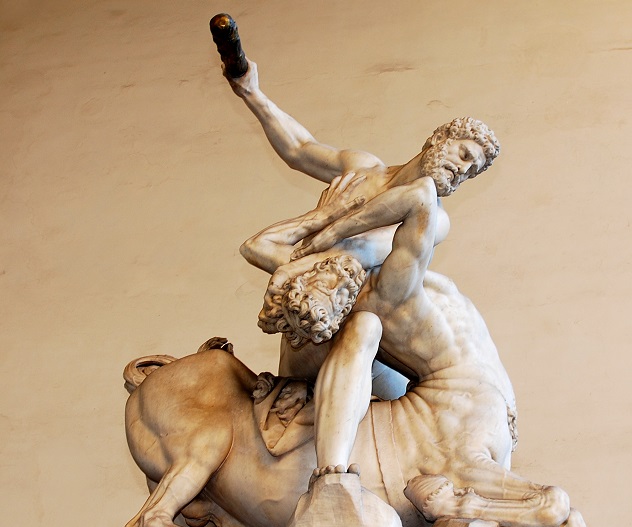
Hercules (or Heracles) is one of the most famous characters in all of Western mythology, most known for his 12 labors. It was during the fourth of them that a meal got a little out of hand. Hercules had been tasked with hunting the Erymanthian Boar, a giant beast that was ravaging farmland. While searching, he was invited to dine with a centaur named Pholus.
The two enjoyed a feast of meat, but when it was over, Hercules wanted something to drink. He saw that the centaur happened to have a bottle of wine and suggested they open it and share a glass or two. “It’s not mine,” Pholus told him, “It belongs to all of the centaurs, and they’d not be happy if I shared it.”
Hercules was apparently very persuasive, because the wine was opened. The smell alerted the other centaurs in the area, who came armed with rocks to stone the demigod to death. Hercules killed several with his bow, then chased the ones who had fled for several miles to finish them off. In the process, he accidentally shot Chiron, an immortal centaur that hadn’t been part of the first fight. Hercules was using arrows that were tipped with poison from the Hydra, so Chiron’s wound couldn’t be healed.
These arrows were the undoing of Pholus. He picked one out of the bodies from the original battle, accidentally dropped it on his foot, and died. Chiron, meanwhile, found the pain of his wound unbearable and begged Zeus for the ability to die. What started as an argument over a bottle of wine had led to a lot of carnage and the invention of euthanasia.
7 Fart Man vs. Caribou Man

The Innu, a native people of modern-day Canada, have a god named Matshishkapeu, which literally means “Fart Man.” He is said to have a poor grasp of the Innu language and have control over digestion, particularly the latter stages.
Another deity is called Caribou Man, or Kanipinikassikueu, who controls the wandering beasts that the Innu rely on as a source of food. He was once a man, but he fell in love with a female caribou and became one himself. If the spirits of the caribou aren’t properly respected, then the Caribou Man takes them away and the Innu starve.
When Caribou Man started being stingy and the Innu people were going hungry, they turned to Fart Man for help. He approached Caribou Man and gave him an ultimatum: Let the people have food or face the consequences. Caribou Man wasn’t fazed, so Fart Man took away his ability to fart or poop. Caribou Man filled up to the point where his life was in danger, so he relented. That is why Fart Man is said to be the most powerful deity in their pantheon.
6 Tiresias Gets Involved In A Domestic Squabble
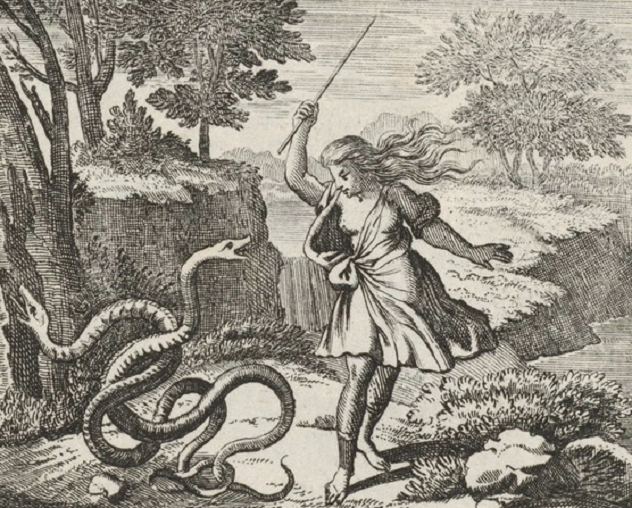
The question of whether men or women enjoy sex more is very difficult to answer. Enjoyment is a subjective thing, and not every man and woman enjoys sex the same. But that’s all logic, and it has no place in a marital argument. That’s why Zeus, king of the Greek gods, ended up arguing the point with his wife, Hera.
Zeus insisted that women got more pleasure out of it, while Hera disagreed. To settle their argument, they turned to the only person who could offer an informed opinion on the matter, Tiresias. Tiresias had been born a man but had been transformed into a woman after he angered Hera by disrupting a pair of snakes in the process of mating. Tiresias was female for seven years when she saw the snakes going at it again. Since she left them alone this time, she was changed back into a man.
Since Tiresias had experienced sex from both perspectives, he was able to confirm that Zeus was correct. In fact, he said women got nine parts pleasure for each one experienced by men. Hera was furious, both at having the secret of women revealed to Zeus and being proven wrong, so she blinded Tiresias in revenge.
Zeus wasn’t able to undo the actions of another god, so he gave Tiresias the gift of prophecy as compensation. The now-blind prophet became a recluse but went on to foretell many of the most important stories in Greek mythology.
5 Redman And His In-Laws

Redman is a Native American spirit said to reside near the Wisconsin River. One day, for reasons that aren’t clear, his wife decided to rob him of his ability to hunt. Because this meant their children would starve, Redman shot his wife. This angered her four brothers, who came to avenge her death. While Redman was able to defeat three of them, he was decapitated by the fourth.
To prevent Redman from coming back to life, the surviving brother threw the head into his fireplace and made sure it never stopped burning. In the meantime, Redman’s body was forced to wander the land, gradually weakening, for many years. Eventually, one of Redman’s granddaughters married into her great-uncle’s family. When she noticed the head, she removed it, but she didn’t realize at the time that it belonged to her grandfather.
Luckily, the head was able to be reattached. Redman was brought back to perfect health with a quick sweat bath. Afterward, he brought his wife and everyone else back to life, while the decapitating brother was turned into an owl. Redman went on to become chief of the Heroka, a race of spirits with powers in archery.
4The 80-Year Quarrel Of Seth And Horus
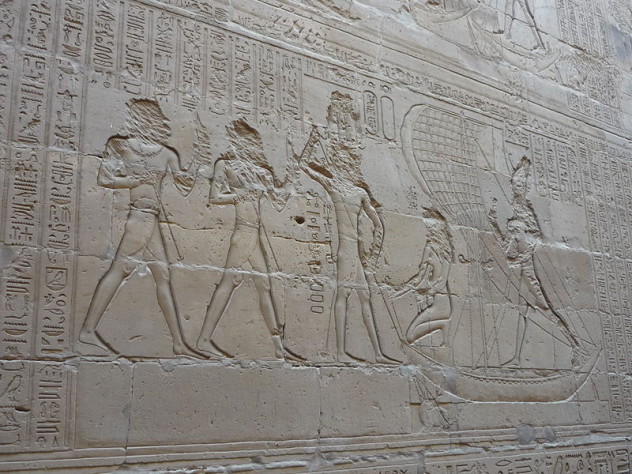
At one time, according to Egyptian mythology, Osiris was king of the gods. His sister, Isis, was his wife. They also had a brother, Seth, who was married to their other sister, Nephthys, and wanted the throne for himself. He presented Osiris with the gift of a fancy coffin, and when Osiris lay down in it to try it out, Seth slammed down the lid and sealed it shut. He then threw his brother in the Nile.
Isis wasn’t happy about losing her brother-husband, so she found him and brought him back to Egypt. Seth cut Osiris into 14 pieces and threw him back in the Nile. Isis managed to gather them all up except the penis, which had been eaten by a fish, so she made him a new one out of mud. She then turned herself into a bird, mated with the reconstructed corpse, and became pregnant with a son. She named him Horus.
Isis wanted her son to take the throne of Egypt rather than her brother. She went to the Great Ennead, the council of the most important gods in the pantheon. The council agreed that Horus should be king, but Seth threatened to stop doing his jobs, so they agreed he should be king instead. Isis complained incessantly until they again agreed to give the crown to Horus. It became clear that this wasn’t going to be settled through the proper channels, so the matter turned violent.
Seth and Horus changed into hippos and battled in the river. Isis tried to help Horus using her spear but just made things worse. Horus chopped off his mother’s head, and when she got it back, it looked like the head of a cow. Horus fled, but Seth caught up to him and gouged his eyes out. Horus was healed and came back. Ra, the Sun god, warned them to stop, but they ignored him and escalated to biological welfare.
Seth decided the best way to prove his superiority over his nephew was to fill him with semen. While Horus slept, Seth slipped his penis between the younger god’s thighs and did what he needed to do—or so he thought. Horus secretly caught his uncle’s sperm and threw it in a river, then released his own semen over some lettuce that Seth was going to eat.
Later, Seth tried to prove his dominance by calling to his semen before the Ennead, and much to Seth’s surprise, it called back from the Nile. Horus stepped up to the challenge and told his own semen to show itself. It called out from inside his uncle, “Should I come out of His ear, I who am Divine Seed?” Angry and humiliated, Seth suggested a boat-building contest, which didn’t go well for anyone. By this point, they’d been fighting for 80 years.
Finally, it was decided that Egypt would be split and each man would be given half to rule. Seth was given control of the South and Horus took the North, where they lived peacefully side-by-side ever after.
3 The Judgment Of Paris
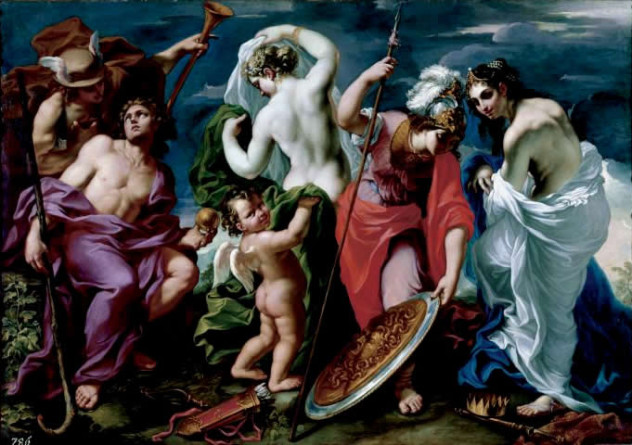
When Greek gods Peleus and Thetis got married, they invited all the other gods to their wedding except for one. The excluded deity was Eris, the goddess of strife and rivalry. While it’s easy to see why she might not be welcome, Eris wasn’t too pleased and crashed the wedding. She brought with her a golden apple inscribed “to the fairest.” Three goddesses at the party were convinced that the description should apply to them: Athena, the goddess of wisdom and warfare; Aphrodite, goddess of love and beauty; and Hera, goddess of women and Queen of the Gods. They asked Zeus for his ruling. Given that Hera was Zeus’s wife and the other two goddesses were his daughters, he was in an impossible situation.
He told the three goddesses to seek the decision of Paris, Prince of Troy. The goddesses shed their clothing and cornered Paris on Mount Ida, where they did all they could to win his affection. Hera tried to bribe the prince with promise of a great throne, while Athena offered him prowess in war. The victor, however, was Aphrodite. She promised him Helen of Sparta, the most beautiful woman in Greece.
The Greeks weren’t so pleased with their treasure leaving to live with Paris, so they sent an army to bring her back. After a full-blown war, some business with a wooden horse, and a fellow named Achilles taking an arrow to the ankle, the city of Troy was burnt to the ground.
The vanity contest that caused so much bloodshed seems to have been a very popular subject for artists throughout history. Wikipedia has a gallery of 37 different paintings.
2 Amaterasu And Susanoo
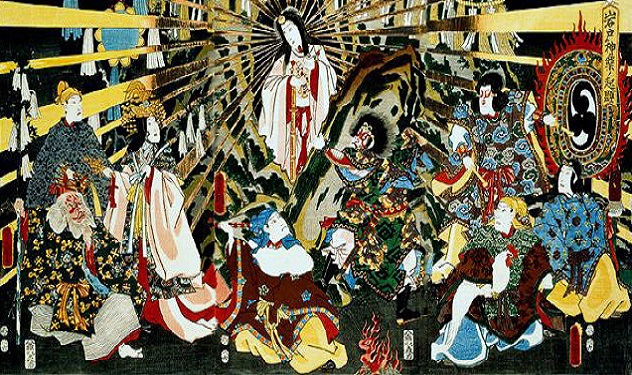
Japanese mythology tells of a pair of siblings, sun goddess Amaterasu and sea god Susanoo, who had children together in a most unusual manner. Amaterasu produced them by chewing her brother’s sword and spitting out the pieces, while he munched on her jewels. After reproducing with his sister, Susanoo went on a rampage, smashing down the walls of Amaterasu’s paddy fields. He then threw his own excrement all around heaven. Amaterasu tried to ignore this behavior, until Susanoo threw the flayed corpse of a horse into her weaving hall. This shocked one of the seamstresses so much that she pricked herself and died. Amaterasu decided that living in a cave was better than putting up with any more of Susanoo’s tantrums.
Since Amaterasu was the sun goddess, this left the rest of the world in darkness. The other 800 gods weren’t sure how to persuade her to come out, so they decided to trick her. They set up a mirror outside of her cave and held a party. When she asked how they could be so happy in the darkness, they told her that another, even more illustrious god had turned up. Amaterasu came to the entrance of the cave to check. She saw her reflection but thought it was another goddess. When she came out to investigate further, the other gods covered up the entrance of the cave behind her so she couldn’t get back in.
1 The Revenge Of Chi’ih

According to Chinese mythology, there was once a sword maker named Kan Chiang. Kan was the best sword maker in the land, so the king, Ch’u, called on him to make a pair of swords. Kan had problems with his furnace and making the swords took longer than he had planned. When he eventually went to see the king, he took only one sword, so the king had him killed. While that’s certainly an overreaction, there are plenty of real kings who have killed people over even less. It’s the reaction of the Kan Chiang’s son, Chi’ih Pi, that pushes the story to extremes.
When Chi’ih Pi grew up, he asked his mother about what had happened to his father. She told him about the king’s rage and passed on a message from Kan Chiang: “As you go out of the door, look south at the hill, and where a pine tree grows above a rock, my sword lies hidden behind it.” The young man went out and found his father’s sword. He decided to exact revenge on King Ch’u. When the king heard about this, he offered a reward of 1,000 gold pieces to anyone that would kill the boy.
When he heard about the price on his head, Chi’ih went moping through the forest, singing a sad song. A stranger approached and asked what was wrong. Chi’ih explained his predicament, and the stranger made an offer. “If you let me chop your head off, I will take it to the king and pretend to want the reward, but I swear I’ll use the opportunity to kill the king for you,” the stranger told him. Without hesitation, Chi’ih slit his own throat. He handed his sword to the stranger before his corpse collapsed to the ground.
The stranger took the head to the king, who was extremely pleased, and suggested boiling the head in a large pot. The king agreed, but after three days in boiling water, Chi’ih’s severed head wouldn’t cook. When the king bent over the pot to find out what was going on, the stranger decapitated him. The king’s head fell into the pot and boiled. The stranger finished by chopping off his own head and letting it fall into the pot as well.
+ The Curse Of Canaan
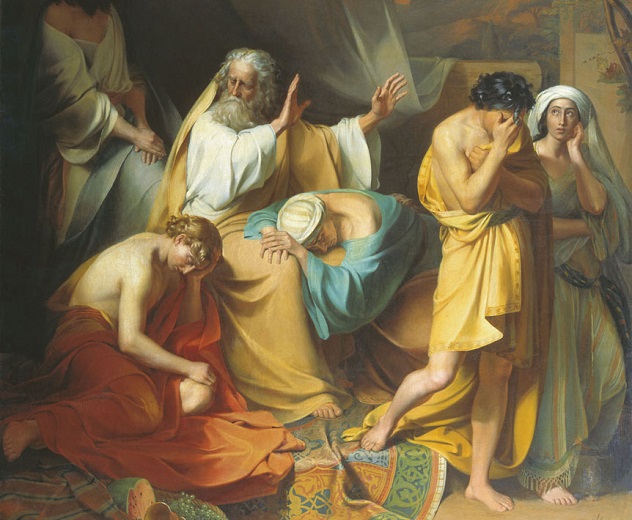
It seems that Noah was riddled with a lot of survivor’s guilt over the whole Ark thing. Whatever his reasons, one night, Noah decided to get extremely drunk on wine and pass out naked in his tent. That would’ve been fine, except Noah’s son, Ham, happened to walk in and catch a glimpse of his dad passed out and nude.
Ham told his brothers, who decided to walk into Noah’s tent backward with a blanket to cover the old fellow and preserve his dignity. While the boys who acted virtuously were spared, Ham’s mockery earned Noah’s wrath. In revenge, Noah cursed Ham’s son Canaan, and every single one of Canaan’s descendants, to be slaves for all time.
What makes this particular overreaction awful is that the story was used as a justification for the African slave trade. Some Christians argued that “darker races” were descendants of Canaan and hence had been cursed by Noah to be slaves.
Follow Alan on Twitter or he’ll blow up the world. Twice.








